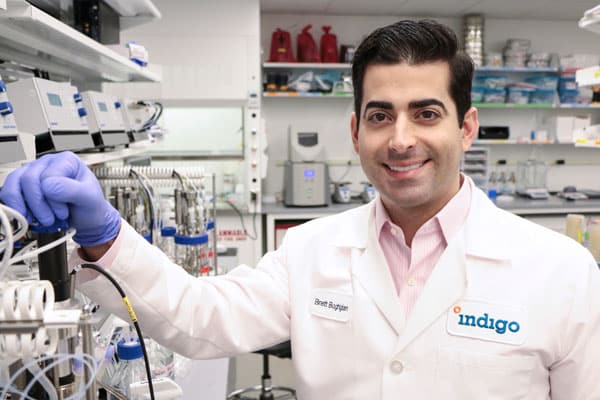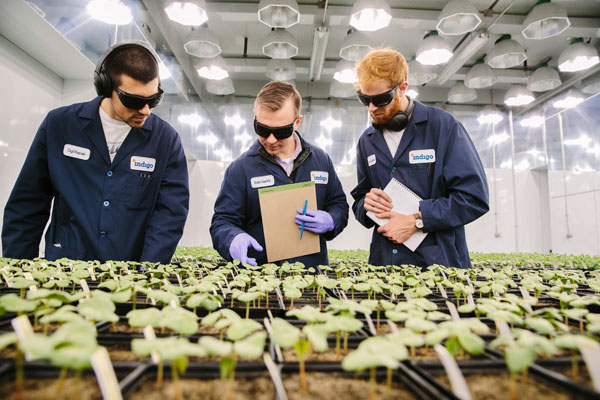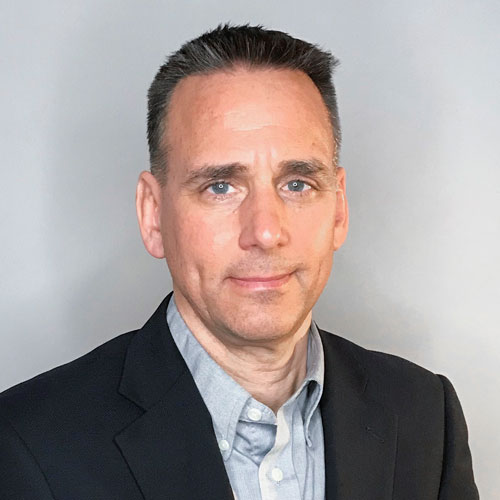
There’s been a surge of interest, particularly in the new century, in the many benefits of a probiotic diet and the cultivation of a healthy microbiome within the human gut. Now, Indigo Agriculture wants to introduce that same idea in the plant world.
By analyzing the microbes found inside, on the leaves of, and in the roots of plants, the company has developed and commercialized microbial seed treatments for key crops: corn, cotton, rice, soybeans, and wheat. The treatments, which are natural and non-GMO, will help boost crop yields, make the plants more drought-resistant, and, ultimately, improve the sustainability of farming by reducing pesticide use and lowering chemical and fertilizer run-off into watercourses.
Brett Boghigian, senior director and head of project management and facilities, is overseeing the build-out of more office spaces, grow spaces, and labs as the company continues to expand. Here, he discusses how his expertise has helped him with the work and what the particular challenges are.
So, you’ve been with Indigo almost since the beginning. How’d you come to join the company?
Yeah, I’ve been here about four years now. I was introduced to Indigo through founder Geoff von Maltzahn. I worked with him at a company he founded before Indigo, in the therapeutics space. I’ve known him for about eight years, and he brought me into that first company just out of graduate school, and then he brought me into Indigo.
What got me excited in the beginning was that we were a technology company developing microbes to be used as seed treatments to improve the productivity and resilience of plants against stresses. I had worked with microbes in a variety of capacities, from engineering them when I was in graduate school to developing them to make molecules for nutritional and therapeutic uses.
As we’ve grown, our ambitions have grown. What excites me now is the rate of growth that we’ve had and the fact that I see our technology being able to impact hundreds of millions of acres of farmland.
What was it like when you first walked in the door four years ago versus now?
We were in Cambridge, Massachusetts, which is just about a mile from where we are now, in Boston. In 2014, we were about eight people, and I was the first person that wasn’t entirely within R&D. It was very much a startup. Now we’re over 300 people.
You mentioned your background in chemical engineering. How much did that prepare you for the job coming in?
I had never worked in agriculture before, and it was one of the concerns I had when I signed up. I’m an engineer, so obviously I’m biased, but I think chemical engineering training teaches you a broad skill set. People go work at drug companies or oil refineries and all things in between. Chemical engineering sets you up to solve macro-level questions.

It sounds like there were ways in which it prepared you for both the microbial work Indigo does and the facilities work needed to build its labs.
I run both project management and facilities for the organization. That ranges from research collaborations that we have with universities to our product-development process to our capital projects. At first, facilities was just a thing that some of us did because we needed to, and then it became a real function and I took ownership of it. There is a lot of lab infrastructure involved, and understanding the science and technology and the product-development process was really important. We needed to design the facilities to support that—not just today but as we continue to grow.
You’re at about 300 people and climbing, and you’re now spread out in different locations. Are there specific facilities needs you’re anticipating as you continue to grow?
We’ve now got about a 40-person team in Memphis, Tennessee. There aren’t a lot of agricultural companies in Boston, and Memphis is a lot closer to a broad customer base. There, we are in the process of growing a site responsible for logistics, supply chain, customer service, sales, and all the stuff that’s more grower facing.
In Boston, at our corporate headquarters, is where R&D, software technology, and all corporate functions reside. We’re currently 200 people and will continue to grow there to support the broad business and technology development, and proportionally we’re building out a large sales team. We’re also building out R&D in Research Triangle Park, in North Carolina.
Are there particular challenges or concerns when designing R&D facilities for your kind of work, with microbes and plants?
Our microbes are naturally occurring, but we have to harvest plant samples and extract their microbiome, the community of bacteria and fungi that live within them. We ship a lot of plants back to Boston to be able to do that. This requires BSL-2 specifications on our laboratory space and numerous pieces of automation equipment to efficiently identify beneficial microbes that would make good products.
To enable year-round testing, we have invested in state-of-the-art indoor grow rooms. These precisely mimic environmental conditions such as light, temperature, and humidity. When we moved into our Boston headquarters, these were the biggest grow rooms Conviron had built.

You were there for Indigo’s first product, and you’ve seen the company reach $1.4 billion in value. How do you see your current work helping to take the company to the next level?
I feel really fortunate to have been a part of Indigo in its infancy, and now to be a global commercial company is thrilling. We’re constantly learning, growing, and expanding our ambitions in order to improve grower profitability, environmental sustainability, and consumer health. To be adept at delivering against our expanding scope, we rely heavily on project management. When we were launching our first product, we made a list of the questions we needed to answer and developed a project plan to get there. It was the most exciting project I’ve worked on in my career, and I know that’s true for many of us here at Indigo. Project management is at Indigo’s core, whether we’re developing a microbial product, software tool, or new facility.
Photos: Lara Woolfson/Studio Nouveau, Richard Mandelkorn, Courtesy of Indigo Agriculture


